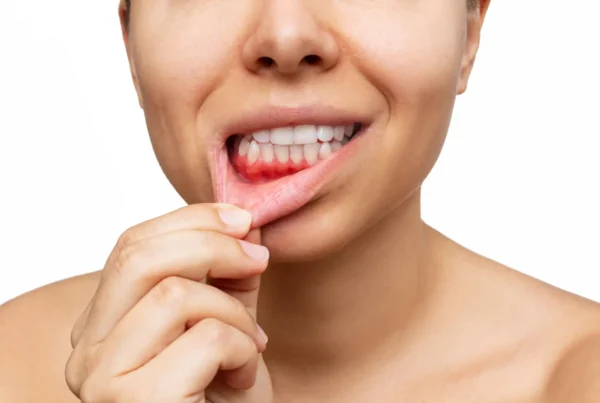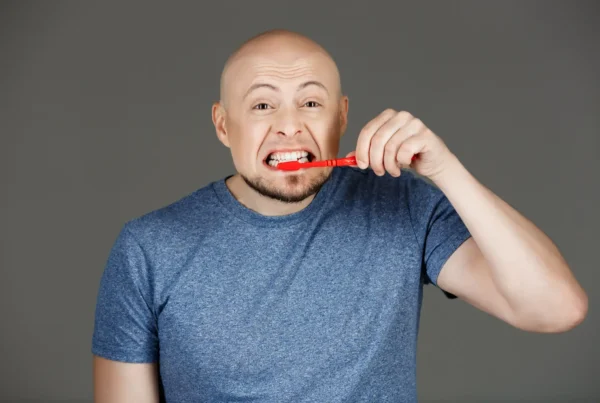Oral microbiome – what should you know about it?
We often hear about the influence of gut microbiota on processes in the human body. But what about the oral cavity? How do the bacteria living in it affect our health? What exactly is the oral microbiome? How does its imbalance reflect on the body? And is it possible to restore the oral microbiota? You will find the answers below.
What is the oral microbiome and what does it include?
What do we call the oral microbiome? It consists of both the microbiota, meaning various microorganisms, and the environment they live in. The oral microbiome is home to over 700 different species of bacteria, fungi, viruses, archaea and protozoa, making it extremely diverse. These microorganisms reside in different parts of the mouth, some more abundant than others. The microbiota of saliva differs slightly from that of the tongue, cheeks, gums, tonsils or palate. Interestingly, just one millimeter of saliva can contain up to 100 million microbial cells. The oral microbiome is highly sensitive and varies depending on oxygen levels, nutrients, pH and other factors.
The role of the oral microbiome – how do bacteria in the mouth work?
Bacteria in the mouth play an essential role. Their primary task is to regulate the digestive system, since digestion starts in the mouth. Moreover, oral bacteria may have anti-inflammatory or pro-inflammatory properties. If oral tissues are damaged, bacteria may intensify inflammation, which triggers the immune system and stimulates the production of lymphocytes and antibodies. The oral microbiome is also involved in enamel remineralization and demineralization, influencing plaque and tartar formation and the progression of tooth decay.
Oral microbiome dysbiosis – what happens when microorganisms lose balance?
The microorganisms in the mouth, nose and intestines live in balance within their microbiota. They are in constant interaction, cooperating or competing with each other. Disruption in their quantity or quality, known as dysbiosis, may lead to health issues. When this balance is disturbed, problems begin to arise. The oral microbiota supports immune defense and strengthens teeth. When the symbiotic cooperation between bacteria breaks down, the conditions in the mouth change and the bacteria on teeth or tongue can become the source of disease. Pathogenic bacteria in the mouth can, for instance, promote tooth decay.
What causes oral microbiome imbalances?
It is difficult to determine the exact causes of microbiome imbalance, as it differs in each individual and responds even to minor changes. However, several contributing factors can be listed:
- Poor diet
- Smoking
- Genetic predisposition
- Improper oral hygiene
- Local oral infections
- Systemic diseases such as diabetes
- Weakened immune function
- Salivary gland disorders and reduced saliva production
- Use of antibiotics or antibacterial agents
READ MORE: Teeth during chemotherapy
Is dysbiosis related to gum disease?
Dysbiosis can be linked to tooth decay and gum disease. In the case of cavities, bacteria feed on carbohydrates, producing acids that lower the pH around teeth and cause enamel demineralization. These acid-producing bacteria adapt to the acidic environment, begin to dominate, and lead to dysbiosis. This increases the risk of developing cavities.
A similar process occurs in gum disease. A good example is the pro-inflammatory bacterium Porphyromonas gingivalis, which requires iron and heme to survive. These are supplied during gum inflammation and bleeding, allowing the bacterial population to grow and the gums to deteriorate.
How does dysbiosis affect general health?
Oral bacteria can be linked to respiratory diseases, certain cancers, liver conditions and even meningitis. They may also contribute to gastrointestinal diseases. These conditions often correlate with specific changes in the microbiome. For example, in Alzheimer’s disease, researchers have found periodontal bacteria in the brains of patients. Moreover, the greater the bacterial load in the brain, the more advanced the disease. It appears bacteria may play a leading role in its development.
Oral bacteria also regulate blood pressure
Oral bacteria help regulate blood pressure by metabolizing dietary nitrates into nitric oxide, which dilates blood vessels.
How to restore the oral microbiota?
The most important step is maintaining proper oral hygiene, including regular tooth brushing, flossing and using mouthwash. These habits reduce the risk of dysbiosis. If tooth decay or gum disease is present, they should be treated promptly. A healthy diet low in sugar is also crucial. Supplementing with probiotics, especially those containing lactoferrin, can support the restoration of a healthy oral microbiome.





